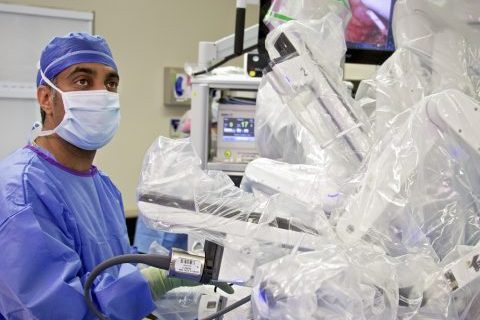
June 17, 2019
A general surgeon is a specialist who is trained to manage a broad spectrum of surgical conditions affecting almost all areas of the body. Besides establishing diagnosis and administering preoperative, operative, and post-operative care to patients, a general surgeon is often responsible for the management of trauma victims and critically ill patients. All surgeons start their initial training in general surgery and then go on to specialize in other specialties. The education of a general surgeon ensures that they have a sound knowledge of treating various diseases of the human body. In this blog, we provide you with the different types of surgeries General Surgeon need to perform. Have a look.
1. Cholecystectomy
Cholecystectomy is a surgical procedure to remove gallbladder, a pear-shaped hollow organ that lies beneath the liver, which collects and stores the digestive fluid called bile. A gallbladder removal surgery may become necessary when accumulated gallstones block the flow of bile, and the person experiences pain and other symptoms. Types of this surgery includes :
Open Cholecystectomy: In this procedure, General Surgeons make a 5-7 inch incision into the upper right side of the abdomen below the ribs. After that, the surrounding tissues and muscles are pulled back to remove gallbladder. This procedure is obsolete except in rare circumstances where a minimally invasive approach is not feasible.
Robotic Cholecystectomy: In this procedure, surgeons make 3-4 small incisions through which a tube with a miniature video camera is inserted into the abdomen. The surgeons are able to watch the video on monitor even as they operate on the patient with surgical tools to remove the gallbladder.
2. Colorectal Surgery
The colon is a hollow tube that run from the small intestines to the anus. The basic function of the tube is to absorb water and store waste products that are later excreted. Colorectal surgery is a procedure that helps in correcting a number of complications related to the colon, rectum, and anus. The surgery involves repairing damage caused to the colon, rectum, or anus by lower digestive tract diseases, such as inflammatory bowel disease, diverticulitis, or cancer. When it comes to colorectal surgery, there are a number of procedures available, including colostomy, endoscopic surgery, colectomy, and many more.
3. Hernia Surgery
A Hernia is a bulge that results when internal organs pushes through an opening in the muscle or tissue that holds it in its place. This typically happens at places of inherent weakness allowing the passage of structures through a hole that shouldn’t be there. Hernia surgery is performed using a laparoscope that is inserted through one incision to provide lighting, while other incisions are used to insert tools that are required to access the problem area and execute the necessary repairs.
4. Anti-Reflux Surgery
GERD or gastroesophageal reflux disease is a widely prescribed procedure, with more than 60 million Americans these days experiencing the symptoms of acid reflux. Although acid reflux is not a major health concern, if not treated in time, it may lead to worse conditions. The production of gastric acids in the stomach can damage the esophagus and in some cases lead to esophageal cancer. LINX is an ideal surgical option when non-surgical treatments and medications of reflux fail to provide relief. The device is made up of titanium magnets that ensure easy passage of food or drink to the stomach and prevent gastric contents to reflux. The device is placed through a laparoscopic surgical procedure.
Wrap Up
Undergoing any surgical procedure, including general surgery, is an important decision that needs adequate research and knowledge before finalizing on a decision. If you are looking for a general surgeon in Dallas, TX, or Fort Worth, look no further than DFW Bariatrics and General Surgery, a reputed health care provider where you can find the best general surgeons in Fort Worth for various procedures including general and weight loss surgeries. Consult today to discuss if general or bariatric surgery in Dallas or Fort Worth is best for you. To schedule an appointment, click here or call 469-620-0222.
